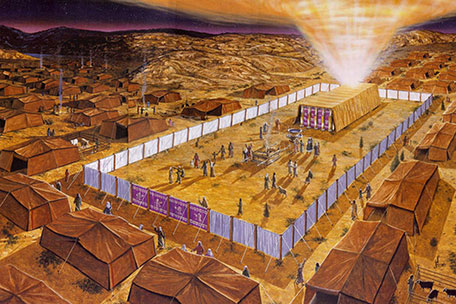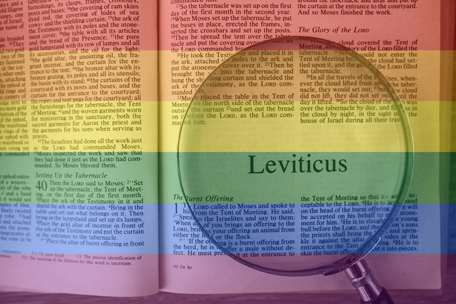There’s a difference between being gay and committing sodomy. One is a choice!
LGBT History
Leviticus 18:22. Bible and homosexuality
Justifying homophobia.
“You shall not lie with a male as with a woman; it is an abomination.”
Leviticus 18:22 (New Revised Standard Version).
When writing the article Bible and Homosexuality: word of God, we wanted to focus on the origin of terms such as “sodomite” and “homosexual”, which can be found in different versions of the Bible, in order to show that such terms were never used or even imagined by the authors of these books.
This meant leaving out some texts in which the subject of relationships between persons of the same sex appeared more or less directly, as it happens in the verses that we will be dealing with in this article, Leviticus 18:22 and Leviticus 20:13. Also in the letter To the Romans, by Paul of Tarsus with his “shameful passions” and even in the disturbing “More wonderful was your love than the love of women.” by King David to Jonathan, found in the books of Samuel.
It was not our objective to judge what the customs or sexual morality of Jews, Catholics and Muslims were, either generally, or more specifically with regards to homosexual relations. These late ones are understood, of course, as those involving two men, since it is well known that the god of the bible has no “known” problem with lesbian relationships, as evidenced by the absence of direct references to sex between two women.
Leviticus 20:13. Killing fags.
“If a man lies with a male as with a woman, both of them have committed an abomination; they shall be put to death; their blood is upon them.”
Leviticus 20:13 (New Revised Standard Version)
However, when we were asked about our “analysis”, and therefore our opinion regarding what is said in the Leviticus on homosexuality in response to our article (Bible and Homosexuality: word of God), we realized that this matter could not be settled in a few lines in the comments section, and deserved a real article where we could treat the subject with the depth it deserves.
In Leviticus 18:22 and especially in Leviticus 20:13 we are no longer faced with “small” but obvious errors of translation where the sacred prostitutes or the inhabitants of a small village on the shores of the Dead Sea were converted into homosexuals and rejected by the god of Israel. Here we are faced, or rather, believers (Christians, Jews and Muslims) are faced with a moral dilemma of the first order. Should gays die? Should they be executed as outlined in God’s law?
Because, let´s make no mistakes, or pretend to deceive anyone. If you stick to the more traditional interpretations of Leviticus, what you get is what you read: Homosexual people, including lesbians, must die because we are an abomination.
This is why it is shocking that people of “good will” do not have too many objections to using Leviticus to defend God’s rejection of homosexuals, forgetting that this same god requests us, homosexuals, to be murdered. This goes in the same package, and therefore it is neither coherent nor legitimate to pick and choose only the part that is of interest to them.
And it is for this reason that discussing whether this text can be translated in one way or another seems irrelevant to us. We even consider it a perverse exercise which only aims at trying to justify ourselves to people who want to kill us. And at this point in time, and in a country (or world) like ours, no way!.
I do not think I deserve death for being gay, nor do I believe that anyone deserves death for loving another man or woman. Neither for having anal sex, practicing a fellatio, or liking to be spanked in the ass. Nor, for that matter, for being turned on by role playing and dressing up as a Little Bo Beep, schoolgirl or butcher. Just as I do not think my neighbor of the fifth floor deserves to die for having an affair with the wife of the guy who lives in the third B, or think that the girl in the park, who earns a living by reading tarot cards, deserves to die stoned, as commanded in Leviticus.
This belief has nothing to do with my sexual orientation, nor with the fact that I am an atheist, but it is based on the deep conviction that the life of each and every human being is “sacred”. And any God, religion, belief; text or interpretation of a text that calls this fundamental principle into question seems to us to be barbaric and savage.

Frame from the film “The life of Brian” in which the mob, preceded by women disguised as man, is getting ready to stone somebody. In the present day, people are still being killed in the same way.
This said, we are convinced that although for the vast majority of believers, the death of homosexuals has been surpassed there is still an underlying moral condemnation. And this is a conviction that is built on the idea of a “Christian” sexuality exclusively aimed at procreation in the context of conjugal relationship, justified by interpreting texts that are sacred to them.
The fact that a believer thinks that his life should be governed by a series of moral principles and concrete rules is something that does not concern us and that we assume as part of his ability to decide on his life, his beliefs and his sexuality. However, if he tries to impose these laws on everybody, to limit rights or even to punish people by partially applicating that law, it turns into a very different thing that indeed concerns us.
Even more so when we evidently see the hypocrisy, double standard and extreme severity with which the subject of homosexual relations or practices is treated in comparison to all the other “tiny sins” that, curiously, “heterosexuals” tend to commit within or outside the sacred bond of marriage. Because it is well known that for one’s own sins one often resorts to the god of love and forgiveness of the new testament, “Let he who is without sin cast the first stone”. For the sins of others, though, we resort to the cruel and implacable god of the old testament: “they shall be put to death”.
Finally, and before we begin to analyze the verse properly, I think it is worth remembering that Christians, as established in the Bible Books of Hebrews, Galatians and Romans among others, are not subject to the Mosaic law but to the law of Christ (Galatians 6:2), that is:
“37 Jesus replied, “‘You must love the Lord your God with all your heart, all your soul, and all your mind.’ 38 This is the first and greatest commandment. 39 A second is equally important: ‘Love your neighbor as yourself.’40 The entire law and all the demands of the prophets are based on these two commandments.”
Matthew 22:37-40
New Living Translation.
After this brief, but necessary sermon, let us analyze what is said in the Leviticus on homosexuality. Not from the point of view of a law that orders murder of homosexuals but rather from the idea of justifying the pervasive and underlying moral condemnation. In other words, does Leviticus condemn and reject homosexuality and homosexual people?
Leviticus 18:22. The context.
This passage is part of the book known as Leviticus. It is one of the most complex texts of the bible and the most recent within the Pentateuch. Although it is attributed to Moses himself (14th century BC), it was written between the sixth and fourth centuries B.C. (much later). It basically is a kind of Jewish religious manual directed especially, but not exclusively, at the priestly caste of the Levites, who were in charge of the cult and who were chosen only among the members of the Tribe of Levi, one of the 12 tribes of Israel, descendants of Abraham, the first patriarch of Judaism.
All this took also place in a concrete scenario: the supposed departure of Egypt and the occupation by the people of Israel of the land of Canaan, which was to lead to the genocide of Hittites, Amorites, Canaanites, Perizzites, Hivites, and Jebusites, as ordained by the God of Israel.

Recreation of the tabernacle surrounded by the huts of the Levites, surrounded in turn by the rest of the tribes of Israel. Basically they lived in the presence and around God
We are therefore facing a text where the Jewish identity is fundamentally constructed, as opposed and differentiated from that of its idolatrous neighbors. Its center was the tabernacle, where the Ark of Covenant was kept. Inside it were the tables of Moses, the rod of Aaron and the Manna. This required to organize the life of this semi nomadic society of shepherds around the demands of purity and sanctity that implied living in the presence of their god.
“Be holy because I, the Lord your God, am holy”
Leviticus 19:2.
So the Leviticus ends up forming a compendium of moral, social and ritual laws that are usually divided into four blocks::
1-7: Sacrifices.
8-10: Inauguration of the service.
11-16: Laws of purity and impurity.
17-26: Laws of Holiness.
The verses that we are dealing with, Leviticus 18:22 and Leviticus 20:13 are included in this last group.
It should be again remembered that for Christians, Mosaic Laws in general, including those found in the Leviticus are not in force, however it is accepted that the moral laws are still valid.
This is especially important given the fact that there is some debate as to whether, for example, the verses we are dealing with, belong to the group of moral laws or are simply social laws or rituals. This is so, because as we will see next, this is a text that accepts multiple translations.
Leviticus 18:22. The text.
Although no original texts are available, regardless of whether we take the Septuagint version of the Bible translated into Greek (III BC), or the Jewish Masoretic (X century AD), which are the oldest available texts, we can find a Similar construction in them that would literally translate as:
“With man you will not sleep bed woman is detestable.”
Leviticus 18:22 in Greek:
“ka i meta arsenosou (male) koimethese (lie down) koiten (bed) gunaikein (woman) bdelygma (detestable) gar esti”
Leviticus 18:22 in Hebrew:
“hî tō·w·‘ê·ḇāh (detestable) ’iš·šāh (women); miš·kə·ḇê (bed) tiš·kaḇ (lie down) lō zā·ḵār (man) wə·’eṯ-”
It is obvious that the phrase “with man you will not sleep bed woman” has no explicit meaning, and that we must make sense out of it.
The most “modern” Christian tradition wanted to see a general condemnation of both behavior and homosexual orientation in this text, although current theologians, such as the Protestant R. Lings, tell us that there are at least 12 possible interpretations of this text, none of them related to homosexuality.
Incest, ritual prostitution, idolatry or even the prohibition of tarnishing your wife’s bed with certain types of sexual practices could fit this phrase, depending on how the “bed woman” construction is translated. This is where the key to a correct translation of the text seems to be found.
Evaluating the different interpretations is a tempting endevour. To consider some of them valid would allow us to deny the greatest one, and remove these verses from the group of moral laws to include them in simple ritual or social laws that are no longer valid. However we would simply be changing one debatable exegesis (interpretation of the bible) by a surely more debatable one.
In any case, and avoiding revisionist temptations, we will approach these verses from the Christian interpretation. That is to say, the condemnation of all sexual relations between men and consequently, all “homosexual” relationships, including lesbian relationships, as we find it in the English and paraphrased “Living Bible.”
“Homosexuality is absolutely forbidden, for it is an enormous sin”
Leviticus 18:22
“The penalty for homosexual acts is death to both parties. They have brought it upon themselves”
Leviticus 20:13
In the end and beyond any interpretations, the question that remains is this. Does the Bible say that?, does God say that?, how do you go from “with man you will not sleep bed woman is detestable” to “homosexuality is absolutely forbidden, because it is a huge sin.”? How do you come to this interpretation from a text that has no concrete meaning?
Leviticus 18:22. The lie.
To begin with, we can see how the “bed woman” construction comes to mean “as he does with a woman” or “as with a woman” or “as one who sleeps with a woman.”
But beyond the translation, which would be questionable per se, we find that when interpreting the verses, Christians completely disregard the existence of this part of the translated sentence. They eliminate it directly, and “you will not lie with a man as you do with a woman” becomes “you shall not lie with a man”, end of story.
So what you should not do is sleeping with a man. With any man, in any way and in any circumstance. And if disregarding part of the word of God was not enough ( keeping only with what interests them), they take it further. They assume that not only you can not have sex with a man, but you can not even desire or love a man. They even round off the game with a double pirouette and a spin, by giving the words the meaning “you will not have any type of sexual relation with someone of your same sex” so that the lesbian relations came to be included within this prohibition.
So, not only are we faced with a dubious translation, but also the interpretation of this one leaves much to be desired. It would be the same as, if following the ban of eating pork, the Christians would interpret that what the Bible is saying is that one must be vegetarian. You don´t need to be a theologian, nor to dominate Hebrew or ancient Greek to realize that the modern Christian text and interpretation have little to do with the original meaning, whatever this may be.
Leviticus 18:22. The facts.
Therefore, can it be argued that Leviticus 18:22, and, while we’re at it, Leviticus 20:13, unequivocally condemn homosexuality?
Without a doubt, no.
When we talk about homosexuality we talk about a romantic, physical and sexual attraction, as well as the sexual behaviors that occur between people of the same sex. That is, between two women or between two men. We also speak of an identity or sexual orientation of desire itself, independent of sexual practices. One can be straight or gay and yet celibate or even virgin. The church knows a lot about that.
We can keep on dancing around these two verses as much as we want, and we will not yet find a condemnation to women who desire or love other women or to men who desire or are attracted to other men. Thus, no. In Leviticus 18:22 and in Leviticus 20:13 there is no condemnation of homosexuality or homosexual people in general. And anyone who says otherwise, whether Catholic priest, Protestant pastor, Orthodox rabbi or Muslim imam, is lying.
So, what does Leviticus condemn? what is the sin that must be punished with death?
Leviticus 18:22. Anal coitus.
Following the conventional translation of the text it seems evident that the authors did not refer to all sexual or amorous relations between two men, but only to those in which the male was treated as a woman. Here is the ulterior motive of the matter. Today’s Christians solve the problem by ignoring the question, while acussing those who focus on the different interpretations of the “bed woman”, or rather “as you do with a woman” of being revisionists.
However, as early as the tenth century, Rabbi Shlomo Yitzhaki (Rabbi Rashi), who was considered one of the greatest Jewish erudits, and who can not be accused of being a revisionist, wrote that this text refers exclusively to penetration. He literally wrote in his commentaries on the Leviticus:
“As you do with a woman: That is, he that inserts his member as an accessory inside a cosmetic tube”

This was what Rabbi Rashi had in mind when explaining the interpretation of the “bed woman”. If the rabbi were to live today and saw this …
One man could not penetrate, nor of course let himself be penetrated by another man. No more, no less. This was what was detestable, this was what God ordered to be punished with death.
At this stage, The modern Christian interpretation, based on keeping only what is in their interest, frays at the seams or, at least, is increasingly questionable. We don´t need to resort to strange or revisionist interpretations of the “gay lobby”, or focus on whether the verses talk of sacred prostitution or normal love affairs to see this point clearly.
Because in Leviticus 18:22, or so it was defended a thousand years ago, only penetration between two men is condemned. This obviously excludes any other type of homosexual behaviour, not only between women, but even between two “macho men”. Kissing, caressing, masturbation, intercrural sex or even fellatio are not included in this concrete prohibition. (Well, maybe the fellatio issue should be consulted with a rabbi.)
One can argue, that this is “only” the interpretation of a Jew and not of a Christian. And it is true. We however think that the rejection of anal coitus fits as much to the Jewish cultural context, as to the Christian morality. The Christian god does not hate the sinner but the sin; or at least that was what St. Augustine thought. He was the one who so vehemently defended the procreative value of marriage, which therefore derived that, for a “true Christian”, any sexual relationship that does not have procreation as its purpose is intrinsically sinful.
As we have already mentioned, if someone thinks that their sexual life should be governed by this principle, that person is free to do so. But to pretend that all other people abide by that principle and be judged by God or by man if we do not, is taking things too far, especially since it is not justified in the scriptures.
God does not hate homosexuals, he does not reject them, much less asks that they be killed. God seems to care little for homosexuals, or at least the god of the old testament. What seems to concern God, according to the most traditional interpretation of this verse, is that you insert your dick in the ass of a man, and if we take other verses into consideration, also in the ass of your lady. That is what God rejects.
I do not want to end this article without highlighting, for those who have not yet understood, that homosexuality is not about sodomy, not about anal sex, just ask any lesbian. Homosexuality is about loving, feeling good, feeling attracted and at ease with a person that happens to be of the same sex. Homosexuality is about kisses, caresses, hands and intertwined bodies, is about saying I love you, looking into somebody else´s eyes, smiling, wanting to grow old with a certain person, forming a family, having someone by your side.
Of course there is also anal sex sometimes, if you like it, but that is not what makes us homosexuals. That misunderstanding, which turned into an obsession with where you put your penis or with what you do with your ass, can be observed in the hundreds of insults that exist in almost all languages, and that reduce us to simple beings fixed on asses. We can also see this misunderstanding in the bible, and especially in its interpretations, which in the end are no more than justifications of the translator’s prejudices.
Leviticus 18:22. Conclusions.
We were asked by a reader what our opinion about what was said in Leviticus 18:22 regarding homosexuality was, and the only conclusion we have reached after our investigation is that it says nothing.
Leviticus is an ancient text, that tells of a time where men lived herding cattle and worshiping a vengeful and terrible god. A time when a woman who did not remain a virgin until marriage was to be stoned to death, a time where eating with an Egyptian made you unclean, a time when reading tarot cards, disobeying a priest or simply being a rebellious son, brought death upon you.
Leviticus speaks of adultery, of having relations with animals, of having relations with women, men, prostitutes, daughters-in-law, cousins, sisters, aunts, etc. Leviticus also talks about how to have your hair cut, how to sacrifice animals, or how the relationship between the Israelite people, the Levites’ priests and their god had to be. But it says nothing about homosexuality.

Leviticus 18:22 does not condemn sexual diversity.
As for the verses we have focused on, we find the same thing that we discussed in our first article on the subject of homosexuality in the Bible. Great discrepancies between the original text and the Christian interpretation.
The original text gives rise to many interpretations, including some that place that text within what could be considered ritual and social laws that are no longer in force for Christian people. However we see how the less probable and more subjective interpretation becomes the most widely used, again.
These verses do not deal with sexual orientation, homosexuals, or lesbians. At best, we can assume that they talk of a concrete sexual practice between two men. Exclusively between two men. A sexual practice that, according to the oldest interpretation we have, refer to penetration. Going beyond this is pure invention.
Therefore we can safely conclude that Leviticus 18:22 does not condemn homosexuality and homosexual persons. No way. No, no and no again.
But we also want to say that we have found something surprising.
We have found that even if you are a Christian, you can choose not to hate, not to point out, not to judge, not to feel disgust when you see two women or two men holding hands by your side. You can choose not to mobilize against them, not to cast stones at them, not to justify persecution or exclusion. You can choose to live your life as you wish and let other people live their lives as they wish. You can choose to be as tolerant of the “sins” of others as you are with your own sins, those of your children or your parishioners. We have found out that if you are a Christian, neither the Bible nor your god will prevent you from doing so.
Love.
Final translation by Ruth Carballo Gallego.
Recommended links: - I love Sodom - I Survived SodomTag :History, Homophobia, Religions And leave us a comment
Leave a Reply
-
Yes, there is more than one difference, so? What do you want to tell us?
-
Yes, especially for lesbians.








Something to say?
Tell us what you think of this article. If it’s good or bad, if you think we are idiots, or if you see us in hell. Even if you are a few words person, you can do something to improve people’s lives, helping us to spread it.
Share it in your networks!